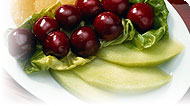health guides
Low-Oxalate Diet

Best Bets
These foods are low in oxalate (0 to 2 mg per serving); eat as desired:
- Apple juice
- Avocado
- Bacon
- Bananas
- Beef (lean)
- Bing cherries
- brussel sprouts
- Cabbage
- Cauliflower
- Cheese
- Eggs
- Grapefruit
- Green grapes
- Jellies
- Lamb (lean)
- Lemonade or limeaid (without peel)
- Melons
- Milk
- Mushrooms
- Pork (lean)
- Poultry
- Preserves
- Nectarines
- Noodles
- porridge
- Oils
- Onions
- Peas (fresh)
- Plums
- Radishes
- Rice
- Salad dressing
- Seafood
- Spaghetti
- White bread
- Wine
- Yoghurt
Foods to Avoid
Scientists once thought that the greater the oxalate level in a food, the more likely it was to increase the risk of forming a kidney stone. However, researchers have discovered that consumption of only certain oxalate-containing foods is likely to significantly increase urinary oxalate. The foods reported by at least one group of researchers to cause a significant increase in urinary oxalate include spinach, rhubarb, beets, nuts, chocolate, wheat bran, strawberries, peanuts, almonds, and tea. Not every study has found tea to significantly increase urinary oxalate. There remains no universal consensus on which oxalate-containing foods belong on this list. Nonetheless, there is a growing awareness that the important issue for people with a history of kidney stone formation is to avoid certain high-oxalate foods—those that are most responsible for increasing urinary levels of oxalate.
To avoid oxalates ask about ingredients at restaurants and others’ homes, and read food labels. The following list is not complete. Consult with a healthcare professional before making any significant changes to your diet.
These foods are high in oxalate (greater than 10 mg per serving):
- Beans in tomato sauce
- Beer
- Beets
- Blackberries
- Black and red raspberries
- Blueberries
- Celery
- Chard
- Chocolate
- Cocoa
- Coffee powder (Nescafe)
- Collards
- Concord grapes
- Bisciuts made from soya flour
- Currants
- Dandelion greens
- Aubergine
- Escarole
- Fruit cake
- Fruit salad (tinned)
- Green bell pepper
- Grits (white corn)
- Juices containing berries
- Kale
- Leeks
- Lemon and lime peel
- Nuts (especially peanuts and pecans)
- Okra
- Ovaltine
- Parsley
- Pokeweed
- Rhubarb
- Rutabagas
- Spinach
- Strawberries
- Summer squash
- Sweet potatoes
- Tea
- Tofu
- Tomato soup
- Wheat germ
These foods are moderately high in oxalate (2 to 10 mg per serving):
- Apple
- Apricots
- Asparagus
- Bottled beer (12 oz [360 ml] limit/day)
- Broccoli
- Carrots
- Chicken noodle soup (dried)
- Coffee (8 oz [240 ml])
- Cola drink (12 oz [360 ml] limit per day)
- Corn
- Cornbread
- Cucumber
- Lettuce
- Lima beans
- Marmalade
- Oranges
- Orange juice (4 oz [120 ml])
- Parsnips
- Peaches
- Pears
- Peas (tinned)
- Pepper (greater than 1 tsp [2 grams] per day)
- Pineapple
- Plums
- Prunes
- Sardines
- Soya products (most)
- Sponge cake
- Tomatoes
- Tomato juice (4 oz [120 ml])
- Turnip
- Watercress
Copyright © 2024 TraceGains, Inc. All rights reserved.
Learn more about TraceGains, the company.
The information presented by TraceGains is for informational purposes only. It is based on scientific studies (human, animal, or in vitro), clinical experience, or traditional usage as cited in each article. The results reported may not necessarily occur in all individuals. Self-treatment is not recommended for life-threatening conditions that require medical treatment under a doctor's care. For many of the conditions discussed, treatment with prescription or over the counter medication is also available. Consult your doctor, practitioner, and/or pharmacist for any health problem and before using any supplements or before making any changes in prescribed medications. Information expires December 2024.


 We are proud to announce that
We are proud to announce that  As the market evolves, customers increasingly request a wider variety of omega-3 options for their lipid...
As the market evolves, customers increasingly request a wider variety of omega-3 options for their lipid...  Maintaining healthy glucose levels is crucial for preventing metabolic conditions like diabetes,...
Maintaining healthy glucose levels is crucial for preventing metabolic conditions like diabetes,...  Looking at formulating a new vitamin blend? Discover
Looking at formulating a new vitamin blend? Discover 







































